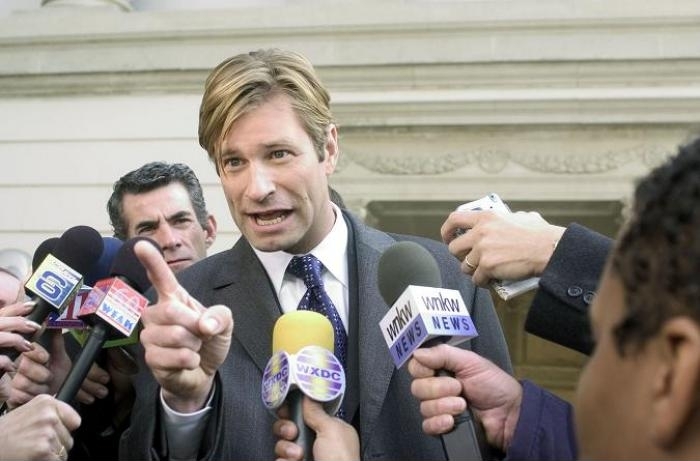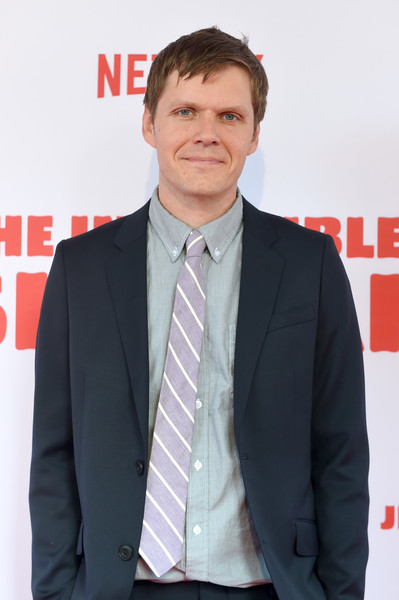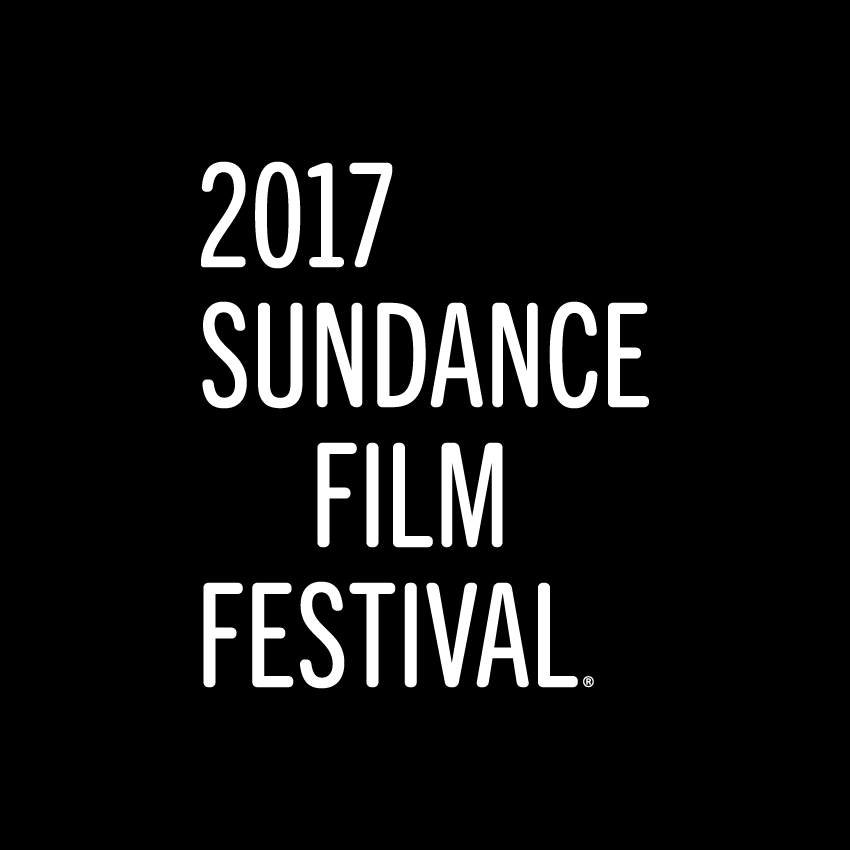As SAGindie celebrates our 20th Anniversary, we’ve opened our archives and unearthed some long-lost features and interviews from years past we thought were worth sharing again. Below is a re-post of one of our archived interviews.
[Originally published in SAGindie Spotlight, March 2006]
POLITICS AS USUAL
An interview with Thank You For Smoking‘s Co-Producer Mindy Marin and Writer/Director Jason Reitman
Remember the good old days of wholesome family values in political films? Where Jimmy Stewart goes to Washington to represent the hard working blue-collar family? When he stands alone in that enormous rotunda and gives that eloquently powerful speech that brings the cold hearted politicians to there knees? Well, THANK YOU FOR SMOKING will probably make Jimmy Stewart roll over in his grave… twice. In this pitch black comedy Aaron Eckhart plays Nick Naylor, a tobacco spokesman with a silver tongue and absolutely no moral compass. The Sundance fav has an all-star cast including William H. Macy, Maria Bello, Katie Homes, Rob Lowe, and Robert Duvall as The Captain.
SAGINDIE: How did you get into producing?
MINDY MARIN: I’ve been in casting for over 25 years. I started out in television in 1978. My first job in casting was working for Paramount Television under a regime that was run by Mary Buck, and the first casting job I ever had was a show called Taxi. From there I went on to Warner Brothers Television where I became the manager of talent for the casting department. From there I parlayed my career into the world of features, which I had always been most interested in. I created my own company some years later and I’ve been going from lily pad to lily pad ever since. In 1990, I established Casting Artists Inc. and from that came my production company Bluewater Ranch Entertainment. I had been casting films and a natural extension from that was my move into producing.
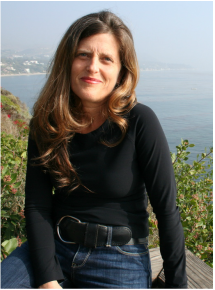
How did this project come to you?
MM: It came to me about four-and-a-half years ago. A very good friend of mine had been working with Mel Gibson at Icon, had gotten ahold of Thank You For Smoking through Mel’s channels. Mel was very interested in the book, he had bought it with my friend Jim Lemley for Icon to do. They held onto it for quite a few years and Jim was trying to help Mel and his partner Bruce Davey find the right director. They had discussed Jason Reitman for the job and he was absolutely passionate about Chris Buckley’s novel and he went in and pitched his take on it. They liked his take on it so much that he got the job. Jim Lemley was kind enough to tell Jason about me and we sat down and discussed the preliminary stages of getting it fired up at Icon. Due to various other priorities they had going on at Icon at the time, other things took precedence. They ended up doing other projects and this great film languished there for many years. I stayed in touch with Jason, who I thought had great energy and great ideas and had certainly written a great script. One day I very unexpectedly got a call from Jason who told me that he had been contacted by David Sacks, who was new to our business. David and his partner had just sold PayPal, which they had created at Stanford, to eBay. They made a lot of money on that deal and David wanted to get into the film business and when he read the script for Thank You for Smoking and loved it but it was still attached to Mel Gibson’s company and Warner Brothers. He really wanted it so they worked out a deal for a short window to try to get it set up, and that’s when Jason called me.
Jason, how did you go about adapting the novel to a screenplay?
JASON REITMAN: It was a very true adaptation and Christopher Buckley was involved from start to finish. My real addition to story was in building the relationship between Nick and his son. I thought if Joey liked his father, then we could. That somehow Joey was the window to Nick’s soul.
What are the biggest differences between the novel and the screenplay?
JR: They are very similar. I think the main differences draw from the minimization of the kidnapper plot from the book and the maximizing of the father/son plot. Otherwise, the sense of humor holds pretty true. Of course, a novel gives you the opportunity to try things of different broadness and tone, where the film is shorter and therefore must hold to a more singular tonal line.
Mindy, how did you get the cast together for Thank You For Smoking?
MM: Jason, David, and I had a meeting in my office early on to approach the subject of casting. Jason had been involved with the film for so long and had invested so much of himself emotionally, he certainly had ideas on the way he wanted it cast. David had ideas as well and I brought my casting thoughts to the table. Our first meeting we discussed who fit into which role the best. It was this sort of free form conversation on why we each felt certain actors gave the film the kind of character and angle that the roles deserved. We began the process by breaking down all the roles into our first choice and then we came up with second and third options. I took the guys to several agencies and we sat down and discussed who the filmmakers wanted and then the agency would tell us who they had that would be available for our time frame and who would fit the bill. The first actor that they met during the David Sacks era was Aaron Eckhart. I told them why I felt passionate about him playing the lead role, how for me he was just the perfect fit, and fortunately they agreed with me. We flew up to Canada where Aaron was shooting a movie and sat with him and we got along really well and he came on board. From that we kept plugging along filling each role.
Did you get many rejections along the way?
MM: I don’t take no for an answer, I think that is one of my strong suits. A no sounds like a yes to me. When an actor is so clearly right for something and for whatever reason they say no, it’s my job to work that into the yes I think it should be. I had my hands full on this one addressing the front lines of talent. A lot of producing is just that, there is no movie without talent.
How did you get Robert Duvall for the film?
MM: Robert is not somebody who would ordinarily do a such a small film. Usually an independent couldn’t afford a veteran actor like Robert Duvall. But in this case I felt that if he read the script he would love the material, and in our casting discussions his name kept coming up as the perfect tobacco baron. We looked into it and heard that he was down in Argentina at the time because he is a big tango dancer. I threw out to David that if we wanted to get him we would have to do something clever to get him to pay attention to the script. We needed a plan to get him to really sit down and read the script. We knew he loved tango and coincidentally David’s mother was very attached to a lot of tango stars in Argentina. David had his mother contact all of the famous tango dancers in Argentina and had each of them sign a picture of themselves, and then we made a book and attached it to the script and sent the package to his hotel with a letter that said, “Come tango with us.” He either thought we were stalkers or crazy or maybe we had something special. Whatever the case, he read our script and he came on board. We were thrilled.
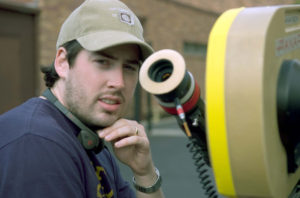
Did you run into any resistance from the government or the tobacco companies?
JR: The only resistance we ran into with either was the US Parks Service that did not allow us to shoot a scene in the book following the kidnapping, in which Nick runs into the reflection pool before collapsing. I point to Forrest Gump. They responded by saying that was based on actual historical events. I said, no – Forrest Gump was a fictional novel. Then, they just said no.
How long did casting take?
MM: We didn’t have a lot of time to get this project together, the clock was constantly ticking on us. Because David has procured the rights for a very tight window we had to pull the cast together inside a nine-week period. It was an amazing feat to balance out and cross-pollinate the schedules of so many working actors. They were very clever and it was a very well-done schedule where they brought in one actor for a week, another in for a couple of days and not have to roll it out for weeks at a time.
How many days did you have to shoot the film?
JR: 35.
Did you lose any actors due to the tight schedule?
MM: It got a little hairy a couple of times. These were working actors, they always have other commitments and that is to be expected. We just did some fancy footwork and even when it looked like we would lose somebody, by hard work and miracles we got by. I remember Sam Elliott, who plays the dying cowboy, had a challenging schedule, but in all fairness they all really did. The only person we couldn’t be creative with regarding scheduling was Aaron because he is in every scene. In the end we didn’t lose anyone, it was pretty miraculous.
How did you create “the look” of the film?
JR: One thing that I wanted to achieve from the beginning was the whimsical nature of the book. This extended to every aspect of the filmmaking, including the slick warm look. My cinematographer and I agreed form the beginning that the film should have a warm, accessible look.
How did you get the producer David O. Sacks on board?
JR: David came to Hollywood and found my screenplay within weeks of arriving. He contacted me immediately and began the difficult process of acquiring the rights so we could proceed with shooting.
Did you have much time to rehearse with the actors?
JR: We rehearsed for a couple weeks at my house prior to shooting. By the way, not enough can be said on what Mindy did to put this cast together. She treated our wildest dreams like reality and was not happy until actors were really reading our script. I look at the cast block on the poster and I still can’t believe what she was able to achieve.
What attracts you to a project to the point where you will devote four years to it?
MM: I didn’t really spend four years on this film. It was really my history with Jason that came to fruition four years later. What keeps me on a project like a dog to a bone is somebody like Jason who has the vision and courage to vocalize it. He was unrelenting in his focus and so clearly a talent that you want to get on that train. Jason is the wave of the future. That’s what fuels my creative juices - to be able to work with somebody who has a vision.
How would an indie filmmaker get talent for their small project?
MM: It all starts with the material. You have to start with something that will attract the spirit of an artist. I would recommend something like what we did to get Robert Duvall’s attention. You need to be tenacious and focus on the end result. Fix your vision and set your sights on the horizon and then figure out how you are going to get there. But it all starts with the script, there is so many bad projects that somehow make it to the screen, so if you have a great piece of material it puts you ahead of everyone else. Also, I can’t tell you how important it is to work with the actor’s representatives, they were instrumental for us. I know a lot of filmmakers think it’s a great idea to go around the managers and agents and get to the actors directly. I think it’s smarter to think of them as part of the entire equation. Bring them in and share your passion with them. It’s great if you have a personal relationship with talent, but don’t be afraid to go to their reps and state your case. That’s what they are there for. We had a lot of agents that ended up being huge fans of Thank You for Smoking and they gave us access to their roster. It’s not like it was a financial payday for anybody, but it was an artistic payday. So don’t take no for an answer, you don’t have to be a stalker, just find a way to finesse the gatekeepers. Hard work will turn a no into a yes.
What are you currently working on?
MM: I am currently working with Jim Lemley on a project called Vamped and I am also working with Andrew Niccol on a project called Manhattan Brave. I am producing a film called Glad All Over with John Herzfeld who I Associated Produced 2 Days in the Valley with years ago, it’s a great commentary on life and living. I’ve got a whole grab bag of things I’m working on.
JR: Another humorous examination of white-collar life.
So if you are looking for something completely different than anything else out there, check out Thank You for Smoking when it is released in a theater near you March 17th.
__
Thanks to Jason and Mindy for discussing THANK YOU FOR SMOKING.
If you’re an independent filmmaker or know of an independent film-related topic we should write about, email blogadmin@sagindie.org for consideration.

